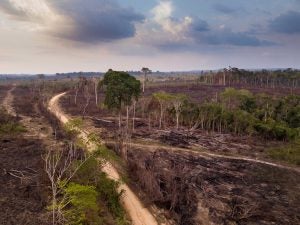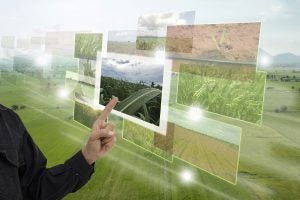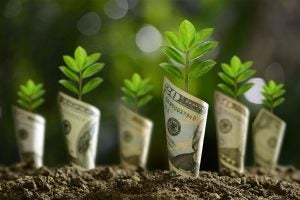In early November, Civic Ledger CEO Katrina Donaghy spoke at the global virtual Agri-D Convention 2021. Held during the 2021 United Nations Climate Change Conference (more commonly referred to as COP26), the event explored how blockchain technology will impact the future of food.
Considering the COP26, where world leaders came together to negotiate how they were going to address the 2050 Paris Agreement, it is timely to talk about blockchain’s role in decarbonization in agriculture and how that relates to food production globally.
What is decarbonization
Decarbonization is not net-zero carbon. It is, in fact, the process of removing carbon from our atmosphere.
So, when we talk about switching from petrol-based cars to electric cars, that might diminish your carbon footprint, but it doesn’t do enough to reverse the damage to our environment.
The most common form of decarbonization is reforestation. However, experts predict that it will take both natural and mechanical means to meet the Paris Agreement global temperature target.

What is hindering decarbonization
The truth we like to ignore is: So long as the world’s GDP depends on natural resource exploitation and consumption, we will not meet decarbonization targets. The reason for this is because the very driver of our capitalist economies are the very things that create carbon and heat up the world. If we continue on this path, our very survival as a species will be threatened.
The problem, then, is there needs to be a radical shift in how we profit from our natural environment. Enter blockchain.
How we reverse climate change while maintaining high GDP
One way to turn the climate disaster around while keeping high GDP is to value nature-based and regenerative industries and approaches. These are industries that restore ecosystems, using regenerative design principles to create future infrastructure and integrate biodiverse-friendly initiatives into all planning and implementation.
Up until now, these have largely been driven by government funding-dependent nonprofits and companies eager to use their corporate social responsibility efforts for good PR. Regardless of who has been driving constructive and restorative initiatives, they have fundamentally been viewed as costs, not assets.
Conservation is viewed as expensive. Regeneration is viewed as expensive. But what if conservation and regeneration were profitable? That’s what blockchain technology is making possible.
How would blockchain technology make conservation and regeneration profitable?
Blockchain, the pooling of data into a shared digital ecosystem, is still in its infancy in many respects, but there are clear use cases for putting this technology to work when it comes to restoring planetary ecosystems.
With regard to agriculture, blockchain is set to play a pivotal role. It all has to do with peer-to-peer markets, transparent pricing, secure trade histories, and DAOs — Decentralized Autonomous Organizations.

DAOs and farmers
DAOs are a new form of organization that is based on blockchain and smart contracts. They run without any human involvement. Instead, they run on an automated set of rules (smart contracts). The rules can be based on computer code and business logic and they govern the operation of the organization.
The carbon market is currently dominated by large corporations from wealthy nations, and carbon trade is plagued with challenges: corruption, inequities, opaque markets, and intermediaries, to name a few.
Small players like specialty-crop farms are not big enough to trade carbon credits, water allocation rights and the like, particularly in developing countries. So, typically, in times of drought, small farmers will end up selling to large offshore organizations to pay off debts — but this just exacerbates the carbon problem.
Mining companies, larger farming conglomerates, and even manufacturers buy farms, plant ecologically destructive monocultures of trees in a set-and-forget manner, and then claim they are meeting carbon offset targets. This is exactly not the long-term solution to decarbonization that the world is looking for.
Because these properties are often poorly maintained, they can become havens for feral animals and weeds, which impact local ecosystems and neighboring farms, as well as local economies. This is why, for example, the Australian government has recently stated it will put a cap on this activity (a maximum of 30 percent of any landholding).
However, thanks to blockchain-powered DAOs, small farmers will soon be able to benefit from participating in the growing natural capital economy. By partnering with other farms of a similar mindset, they will be able to scale their impact and participate in the global carbon market — one of the greatest market opportunities for farmers of the 21st century.
The playing field will be leveled, removing the unfair advantages for big players, and carbon markets will have a greater chance of being priced appropriately with the benefit and opportunity available to all.
Good stewardship of the land will come with great rewards.
Blockchain and valuing natural capital
Up till now, natural capital has been undervalued and underpriced, simply because the markets are opaque, siloed, often proprietary, and rife with intermediaries and complex business rules. There has been no standard way to price the value of biodiversity, soil carbon, water quality, and so on, because these have been treated as external costs outside of the supply chain. Yet, the world economy depends on the efficient transaction of natural resources, and human life depends on a clean and functioning environment.
Blockchains can help to accurately price the commons — natural resources held in common for the benefit of all — because they use a consensus mechanism. Thousands of computers around the world are constantly verifying transactions and coming to an agreement about whether they are valid. If one computer tries to do something bad, like double spend money, then all of the other computers will reject it.
Blockchains can help to accurately price the commons because they are not influenced by the government or any other external party. This allows them to price goods and services fairly without being subject to corruption or bias.

What this could mean for agriculture
For farmers and landholders, the concept of making money through the digital economy is certainly new. And when we talk about conservation and regeneration, we’re not suggesting that farmers stop planting crops and raising animals. What blockchain makes possible is the opportunity to be good stewards of the land by opening up opportunities to new global markets — to farm sustainably, to embrace innovation and new market streams in the face of more volatile environmental conditions caused by climate change and water insecurity.
In practical terms, when farmers face heavy drought, they can still turn a profit through the establishment of DAOs that enable them to sell carbon credits rather than sell out to big corporations that want their land. This is a vital aspect to consider for the future of the world, when we take into account that the wealthiest 1 percent of the world’s population now owns more than half of the world’s wealth.
As more and more farmers embrace the digital natural capital economy, the benefits in terms of increased soil health, greater water security brought about by land regeneration, and new careers and income will be realized.
This is only the beginning
In the coming decade, the way we profit from natural capital as farmers will undergo a monumental shift from extraction and depletion of natural resources to restoration of natural resources. It’s already happening but we’re just getting started. And our success is vital because the world depends on it.
Blockchain technology is going to form the foundation in this new natural capital economy because it allows it to scale, securely, beyond local jurisdictions and even national borders, in a way that local proprietary markets never could.
If you’d like to learn more about how blockchain is going to help accelerate decarbonization, and transform natural capital markets for the benefit of both farmers and the planet, get in touch with us at Civic Ledger (katrina@civicledger.com).
This article was submitted by Civic Ledger as part of its involvement in the Agri-D Convention, at which AGDAILY was a media partner.


